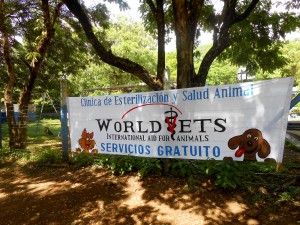
Photo: Katie Horn/World Vets
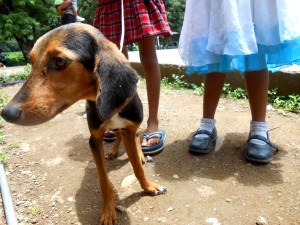
Photo: Katie Horn/World Vets
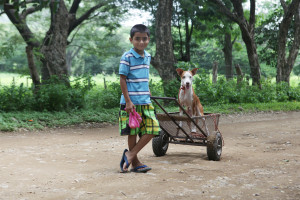
Photo: Van Olsen Photography
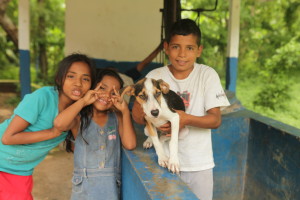
Photo: Van Olsen Photography
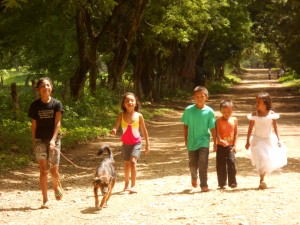
Photo: Katie Horn/WorldVets
As World Vets team pulled up to the local school, which was to be our clinic site, piglets and chickens were busy foraging on the school grounds. Unafraid of our presence they continued about their daily routine. As we proceeded to set up our work stations we were greeted by a donkey that happened to preside over a family’s small agricultural plot next door. He provided constant reminders of his presence, “hee – haw”, that enticed many of us to go see him throughout the work day.
As veterinary services got underway, children and grown men dressed in their Sunday’s best began to form a line around the registration desk. Dogs were brought to us in handbags, on carts and wheelbarrows and cats surprisingly enough were carried in on string leashes or in cardboard boxes. Half came to us to receive spay/neuter surgery and the other half for health consultations
Until recently World Vets had not set up a direct veterinary service campaign in this particular community. Located 25 minutes or so outside of the main town of San Juan del Sur, the rural community of Escamequita is a world of its own. In contrast to town, houses are scattered over considerable distances and made from all kinds of materials; from wood to metal scrap and/or brick. All animals, including dogs, pigs, chickens and turkeys roam free, yet everyone knows which house they belong to. Furthermore, potable water may only be accessible from a well and during the rainy season the only road to and from Escamequita may be washed out, limiting contact with town and its subsequent products and services.
Even though World Vets had never visited the area before, the animals of Escamequita have quite a history with World Vets and the services we have provided in San Juan del Sur over the years. This has much to do with concerned and kind hearted expatriates who also live in the area. Without hesitation, they have rallied local households and loaded up their trucks with animals, accompanied by their owners, to receive our services, wherever they would be provided. The animals brought to us in their vehicles were always the ones that had the worse body conditions and needed the most TLC from our teams.
After years of their dedication and demand for veterinary care, it made perfect sense to bring our services directly to them. Our recent campaign in Escamequita has acted to harness this growing awareness of animal welfare and responsible pet ownership, especially amongst the young population. Many animals from the original “truck loads” were first brought to us to receive spay/neuter surgery. Now we happily welcome them back for follow up medical treatments. And wouldn’t you know it; they were some of the healthiest looking bunch during our recent campaign!
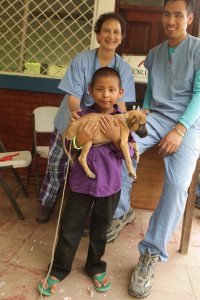
Photo: Van Olsen Photography
Our visit to Escamequita has also served to further promote the concept of animal wellness, specifically for new pet owners who had not previously sought out our services either due to distance and/or logistics. In consultations we saw one young boy who brought his puppy for a check up and to receive preventative health treatments. This is the first step we explained, to being a responsible pet owner, and his father proudly agreed.
More than anything our veterinary services in rural communities such as Escamequita provide the means for individuals to care for and be responsible pet owners. It is a huge misconception that people in foreign countries simply do not care for their animals. They do! This young boy is but one example.
All of World Vets veterinary services are provided free of charge
Story write up: Katie Horn, World Vets International Programs Manager
 Attention VETERINARIANS! We have 2 volunteer positions open for veterinarians on our spay/neuter project in the Caribbean! Join our 14 person team to make a difference for animals on the island of Nevis and have free time to enjoy the island too! This project is scheduled to run March 15 – 22, 2014. See more details here
Attention VETERINARIANS! We have 2 volunteer positions open for veterinarians on our spay/neuter project in the Caribbean! Join our 14 person team to make a difference for animals on the island of Nevis and have free time to enjoy the island too! This project is scheduled to run March 15 – 22, 2014. See more details here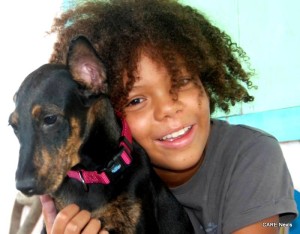 only does it have a huge impact on human health but the overall sustainability of island life as a whole. What presents challenges to controlling the population is that animals roam freely and consequently breed freely, which goes hand in hand with the lack of responsible pet ownership.
only does it have a huge impact on human health but the overall sustainability of island life as a whole. What presents challenges to controlling the population is that animals roam freely and consequently breed freely, which goes hand in hand with the lack of responsible pet ownership.



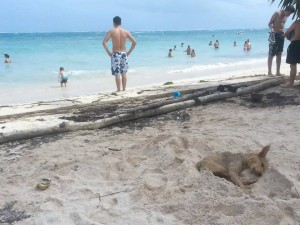
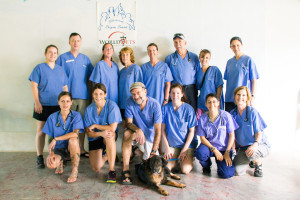 World Vets would like to welcome back it’s teams that recently provided field operatives in
World Vets would like to welcome back it’s teams that recently provided field operatives in 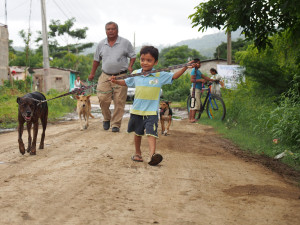 Do you work at a veterinary practice or are you part of a veterinary faculty at an academic institution? Are you looking for an international volunteer opportunity that you and your colleagues and/or faculty and students can do together?
Do you work at a veterinary practice or are you part of a veterinary faculty at an academic institution? Are you looking for an international volunteer opportunity that you and your colleagues and/or faculty and students can do together?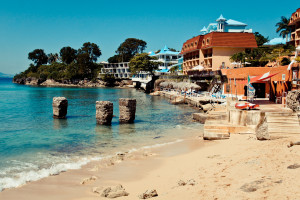 There is just
There is just 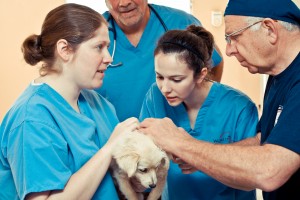 volunteer opportunity
volunteer opportunity 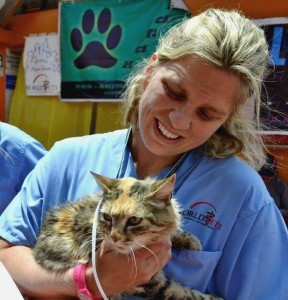 World Vets was in Cusco, Peru this past week. In lieu of World Rabies (Sept 28) and World Animal (Oct 4) Day we held a large scale spay/neuter campaign, in addition to providing free rabies vaccinations.
World Vets was in Cusco, Peru this past week. In lieu of World Rabies (Sept 28) and World Animal (Oct 4) Day we held a large scale spay/neuter campaign, in addition to providing free rabies vaccinations.





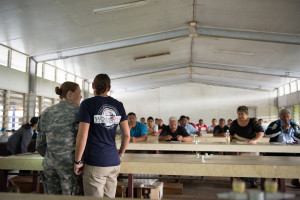
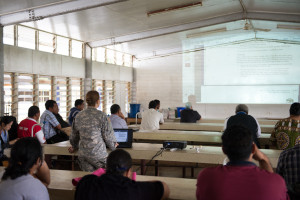
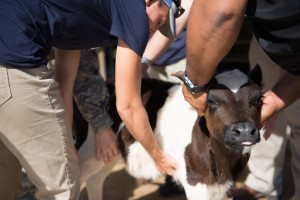
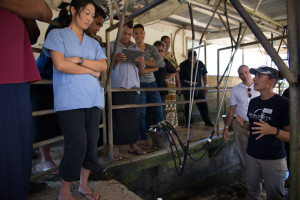
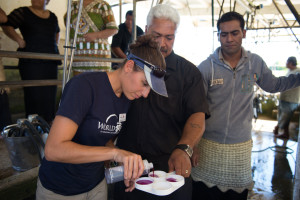
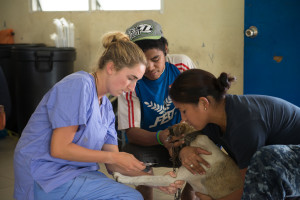
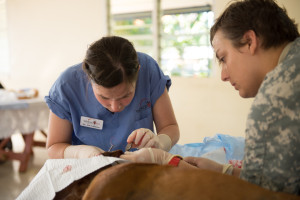
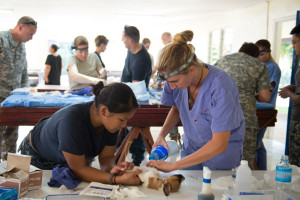
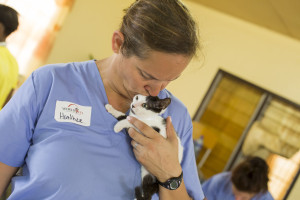 World Vets recently operated a pilot project* in Paramaribo, Suriname. We sent a volunteer veterinary team that provided a very successful large scale sterilization campaign which resulted in 250 surgeries being performed. Our team worked with Henk Abrahams Foundation, a local animal welfare organization. We thank Fondation Brigitte Bardot for their support of this visit as well as all the volunteers for their efforts. See pictures of our Suriname campaign
World Vets recently operated a pilot project* in Paramaribo, Suriname. We sent a volunteer veterinary team that provided a very successful large scale sterilization campaign which resulted in 250 surgeries being performed. Our team worked with Henk Abrahams Foundation, a local animal welfare organization. We thank Fondation Brigitte Bardot for their support of this visit as well as all the volunteers for their efforts. See pictures of our Suriname campaign 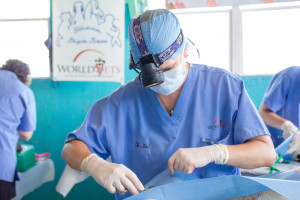 Volunteer veterinarians are still needed for two small animal projects that are scheduled to take place this summer in
Volunteer veterinarians are still needed for two small animal projects that are scheduled to take place this summer in 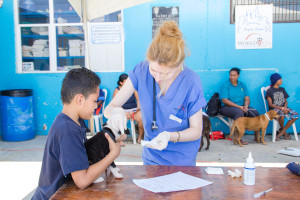 providing sterilization surgeries for cats and dogs, medical diagnosis and treatment, health consultations, and may be involved in performing other surgeries, teaching and/or instruction to students and/or local volunteers or pet owners.
providing sterilization surgeries for cats and dogs, medical diagnosis and treatment, health consultations, and may be involved in performing other surgeries, teaching and/or instruction to students and/or local volunteers or pet owners.